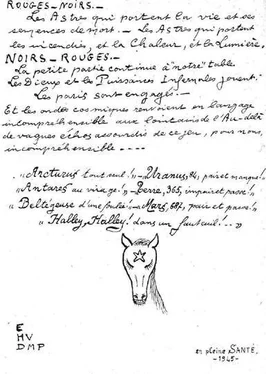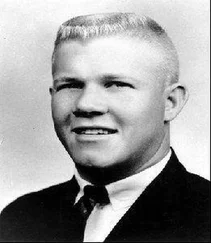Floriot asked about Lavie’s half-sister, Raymonde Baudet, whose forged prescription began the original narcotics investigation. Lavie admitted that he had not heard from her and did not know her whereabouts. He only knew that she was living in the country.
“Yet she must know that we are discussing her at the Cour d’assises and that her presence here would be welcome,” Dupin interjected, trying to cover the fact that the prosecution had neglected to call her to testify.
“How many witnesses does that make whom you haven’t been able to produce?” Petiot asked. “Are we to conclude that they are dead? Did you murder them?”
Dupin then asked the witness if he had been shown a letter from Jean-Marc Van Bever, another alleged Petiot victim who disappeared within days of his mother in March 1942. Lavie said that he had. The police inspector had concealed the signature, but he thought the handwriting was the same as in the letters that arrived at their apartment supposedly from his mother.
The graphologist Edmond de Rougemont did not agree, Floriot noted.
“Maître, if you manage to explain this away,” Véron said, “you will perhaps remove two reasons for condemning your client to death. There will still be twenty-five left.”
MARGUERITE Braunberger took the stand on Saturday, March 30, the twelfth day of the trial and the last one for the prosecution witnesses. As the third widow to testify, Braunberger discussed her husband’s disappearance on the morning of June 20, 1942, noting the mysterious phone call summoning him to a meeting at the L’Étoile métro station on the pretense of taking him to care for a patient at an unknown location on rue Duret.
An usher of the court opened one of the glass cages in the room and showed the witness a blue shirt with white pinstripes and a man’s hat, size 50. Braunberger, embracing them, confirmed that they had been worn by her husband the day he disappeared.
“How do you explain this find?” asked Maître Perlès, the attorney for the Braunberger family.
“The moment has not come for me to answer,” Petiot said.
“I would advise you to do so,” Leser said.
Petiot refused, adding that he would respond after the other witnesses had testified.
“That gives you time to think of a reply,” Perlès said.
“Petiot, I order you to answer.”
The defendant held his ground, promising a rebuttal in half an hour.
“ Mon Dieu , I’m not going to go anywhere.” As the court would soon learn, Petiot actually had an unexpected answer to the accusations.
After Madame Braunberger left the stand, the prosecution called Raymond Vallée to testify about the relationship between Braunberger and Petiot. He was well placed to provide information. A friend of the Braunbergers and a cousin of Georgette Petiot, Vallée had hosted the luncheon where the victim and his alleged murderer met.
Vallée told the court about receiving a letter, purportedly from Braunberger, on June 24, 1942, asking him to bring his furniture to one of Petiot’s properties near the Bois de Boulogne. Vallée admitted that he had been skeptical. He did not understand how Braunberger could have possibly known about the town house.
Petiot’s expressions had been full of disdain, but at one point during the testimony, he lost his temper and jumped out of his chair, shouting at the witness. Leser ordered him to sit down and control himself. A guard, standing behind Petiot, indicated that he should comply, using the familiar tu form, not the formal vous .
“I forbid you to use tu with me!” Petiot yelled at the guard, who simply repeated the order.
“Fuck you!” Petiot screamed.
As the crowd jeered, Leser pounded the gavel and shouted for everyone to calm down. But then, as Petiot started to ask Vallée a question, Leser allowed the witness to leave the stand. Floriot smiled. The clerk of the court, alert to the possibility of a mistrial, whispered to Leser. An usher was sent to fetch Vallée. Moments later, he returned to answer Petiot’s question. It was insignificant.
Other members of the Braunberger household took the stand, including the maid, the cook, and a nurse from Dr. Braunberger’s medical practice. Each one identified the shirt and hat as belonging to the doctor.
Petiot now asked for the two pieces of evidence. “There was no reason for me to kill this old Jew.” Not only did he barely know him, but Braunberger obviously didn’t take any money or valuables with him the morning he left his apartment. There was nothing to gain, the defendant said. As for the shirt, Petiot disputed the prosecution’s claims that it bore Braunberger’s initials. “Do not speak to me anymore about this hat or shirt,” he concluded, literally tossing the items at the clerk. Floriot would soon have more to say about these items.
During the break, Petiot was besieged by audience members wielding copies of his book Le Hasard vaincu and requesting autographs. Some asked for photographs with him. Petiot smiled, joked, and signed away, pausing at one point to sign a copy of his book that he would present as a gift to someone else. He inscribed on the title page: “Very sympathetically, to M. Leser.”
WITNESSES were called next for the Kneller case, including their neighbor Christiane Roart, family friend Klara Noé, and young René’s godfather, Michel Czobor, who told the court how they had also received postcards, allegedly from the Knellers, describing their arrival in South America and encouraging them to follow them abroad. Petiot did not refute anything of substance in the testimony, as it did not contradict his basic stance that he had helped the Knellers escape Occupied Paris.
During the testimony, the attorney for the family of Joseph Piereschi, Maître Dominique Stéfanaggi, again confronted the defendant about his relationship with the Germans: “Why were you released from prison by the Gestapo?”
Petiot clearly did not want to return to this subject. “To insinuate what you want to insinuate, you really have to be a bastard.” He demanded that the attorney retract the question, before adding that he would hear from his cellmates at Fresnes.
Many attorneys jumped in, all speaking at once. Was Petiot threatening the attorney? It sounded that way to many people in the gallery, but actually Petiot was probably referring to a couple of witnesses who would soon testify for the defense. In the meantime, as Leser tried in vain to restore order, the sharp Marseille accent of Maître Charles Henry, the representative of the Paulette Grippay family, drowned out the shouting. Henry suggested that the crux of the matter was not whether Petiot worked for the Resistance, but rather if he had served the Gestapo.
“Me? An agent of the Gestapo?” Petiot asked. “I was tortured and kept for eight months by the Germans.” He boasted of not revealing anything about his fellow Resistance fighters, while “you lawyers of the alleged victims,” on the other hand, launched desperate, last-minute attempts to slander him. “In other words, you are all bastards.”
Maître Henry repeated that the case should be tried before the High Court of Justice, the new tribunal established by the Liberation government to hear cases of treason, which took precedence over a criminal trial. Leser interrupted, advising him not to suggest such a thing. Maître Stéfanaggi agreed with his civil attorney colleague. Petiot began to shout, and so did several other attorneys.
Enraged at the breakdown of protocol, Leser walked out of the courtroom. The magistrates, the clerk of the court, and other officials followed. Someone near Leser said he had actually adjourned the court, but few had heard it if he did. As this chaotic session wound down, Floriot looked pleased, no doubt contemplating cause for a mistrial on the grounds that the président of the tribunal left the room in the middle of the proceedings.
Читать дальше












